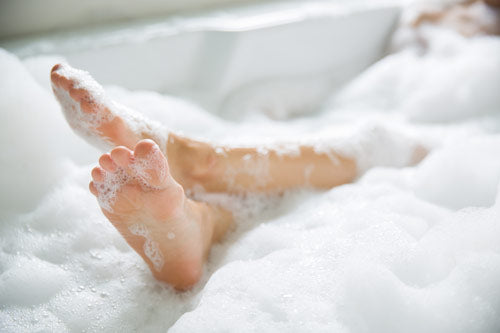Last year, having thought long and hard about whether to move to a new house or extend, my partner and I bit the bullet and decided to go with the extension option rather than have the upheaval of moving.
So, earlier this year, the builders moved in and started to systematically pull the house apart ready for the new extension.
Initially all was good but when they got to the stage where the water softener had to be disconnected whilst all the new pipework, the new boiler and new sinks were fitted, things started to go drastically downhill. This wasn’t from a build point of view, that was going pretty smoothly, it was all about the way my skin was feeling.
Living with hard water was turning from a few weeks to possibly a few months. Baths and showers became dreaded rather than their normal delight. The hard water felt almost sticky on my skin. There was no lather when washing my hair unless I used loads of shampoo and then I needed even more conditioner to avoid all the tangles. Worst of all I noticed my skin was starting to feel very rough, rather than its usual smoothness and was accompanied by my skin changing in its appearance – far drier and flakier than I was used to. I was layering on loads of body lotions and moisturisers and whilst that provided temporary relief, a few hours later, my skin was still dry and uncomfortable.
Then my hands started to become very sore and a week later, I noticed a roughness that I hadn’t experienced before. I couldn’t believe how very different my skin was feeling just from bathing and washing in hard water. This went on for another month, whilst the builders cracked on with the extension. Eventually came the day when the plumber was back to start reconnecting everything. I literally collared him the moment he walked in the door and made sure that the water softener reconnection was the first thing he did.
We now have soft water again and although the extension isn’t quite finished off yet, at least I have my soft skin back.
All this got me to thinking about the effect of soft water on your skin. Its one of those things that ‘if you know, you know’, if you know what I mean! The difficulty is that when you live with hard water, you just expect water to feel ‘like that’ and its not until you experience the joy of living with soft water you realise the big, big difference between hard and soft water. There are a number of studies that have taken place that look specifically at the link between hard water and eczema, one of the most recent was conducted by The University of Sheffield.
With something in the region of 13-30% of children and 2-10% of adults in the UK population suffering from the effects of eczema and skin irritation, it’s a very interesting study that identifies key connections between skin problems and hard water. You can find loads of information about the links online with lots of technical terms, references and studies that have taken place worldwide, but the underlying message is that washing in hard water makes eczema worse.
One study noted that hard water and the minerals that are contained in it have the same effect on your skin as they do on your household pipework, basically leaving it clogged up and unable to perform correctly. Then the author used an analogy which really struck home about what hard water and its minerals does to your skin. They suggested that in the same way that cholesterol acts on your arteries, with a slow build up over a period of time, rendering them unable to carry out their normal function, this is what happens to your skin when bathed in hard water.
The action of limescale on your skin can also aggravate conditions such as acne, rashes and spots. Your body’s natural oils are produced and distributed through the pores of your skin. When the pores are blocked and clogged, the oil gets trapped and causes blemishes and pimples on the skin.
Even more interesting is that the lack of correct natural oils on your skin can cause the skin to age prematurely or at least gives it that appearance. You could be looking older than you actually are! Dermatologists have stated that many of the impurities in hard water, like magnesium and iron, will form free radicals that damage healthy skin cells. This can lead to fine lines and wrinkles and can even lead to the breakdown of collagen, which is the structural protein that keeps your skin looking and feeling firm and healthy.
It’s all very well to read about the benefits of soft water on your skin and it would seem that all the experts concur. The only real way to find out is to try it for yourself. I can guarantee you that once you have, you will never want to go back to bathing in hard water.
I know that I won’t be planning on having our softener out of action, for whatever reason, anytime soon. If you know, you know!

